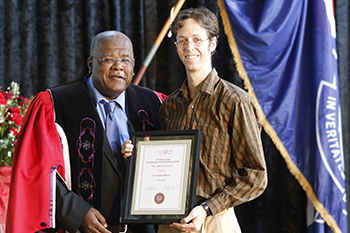Latest News Archive
Please select Category, Year, and then Month to display items
23 June 2023
|
Story Naledi Filita
|
Photo Supplied
 Naledi Filita is an nGAP Lecturer in the Department of Languages in Education.
Naledi Filita is an nGAP Lecturer in the Department of Languages in Education.
The University of the Free State (UFS) is celebrating Youth Month by showcasing the positive influence of the institution on career development. As part of this initiative, we are sharing the stories of UFS alumni who are now working at the university.
Naledi Filita, nGAP Lecturer in the Department of Languages in Education, shares her UFS journey:
Q: Year of graduation from the UFS:
A: 2016, 2018, and 2021.
Q: Qualification obtained from the UFS:
A: Bachelor of Education, Postgraduate Diploma in Education (Curriculum Studies), and Master of Education (Curriculum Studies).
Q: Date of joining the UFS as a staff member:
A: 2021.
Q: Initial job title and current job title:
A: Lecturer.
Q: How did the UFS prepare you for the professional world?
A: I started my career as a teacher in 2015 and was later appointed to my current job. The UFS has equipped me with the knowledge and skills that enabled me to be competent in my field in various contexts. My journey as a UFS student equipped me with crucial skills, such as critical thinking, communication, teamwork, and organisational skills.
Q: What are your thoughts on transitioning from a UFS alumnus to a staff member?
A: It has been a wonderful experience so far. I was once a student teacher at this university. Due to my experiences, being able to instil knowledge and skills in student teachers is something that I am passionate about. I am grateful for the developmental opportunities and support that I receive as a young researcher.
Book Prize for Distinguished Scholarship awarded to Dr Christian Williams
2016-03-24

Prof Jonathan Jansen, Vice-Chancellor and Rector of the University of the Free State and Dr Christian Williams, senior lecturer at the UFS Department of Anthropology.
Photo: Johan Roux |
When Dr Christian Williams moved from the United States to Namibia in January 2000 as part of the WorldTeach volunteer programme for teachers, he had not anticipated an award-winning piece of scholarship in his future. It was during these visits to Namibia, though, that the seeds for his highly-acclaimed book were sewn.
While volunteering at the St. Therese Secondary School in Tses at that time, Dr Williams – now a senior lecturer at the University of the Free State (UFS) Department of Anthropology – became acquainted with some of the school’s alumni. The stories these individuals started sharing with him soon revealed personal histories of exile and violence by fellow SWAPO (South West Africa People’s Organization) members.
These experiences ultimately resulted in Dr Williams’ book, National liberation in postcolonial southern Africa: a historical ethnography of SWAPO’s exile camps, published last year. Due to the book’s literary impact, the university awarded Dr Williams the UFS Book Prize for Distinguished Scholarship on Friday 19 February 2016. Dr Williams is the second academic to be awarded this prize.
Politics of the past
In the 1960s, Namibians mobilised and retaliated against colonial rule under the liberation movement known as SWAPO. This created political tension which resulted in the flight of many SWAPO members to exile camps administered by the party.
“Over its three decades in exile, SWAPO was responsible for the welfare of roughly 60 000 Namibians. This was about 4% of the total Namibian population at independence – most of whom lived in camps,” says Dr Williams. The research originally used as a basis for his doctoral thesis was subsequently developed into this prize-winning book.
Advancing the Human Project
“It’s an honour to receive recognition from the university; it means that they value the kind of work that I am doing. I think it’s great for universities to have such prizes,” Dr Williams says.
Supporting the UFS Human Project, Dr Williams will donate a portion of the R25 000 prize money towards the UFS Student Bursary Fund Campaign, as well as the school in Namibia.The rest will subsidise the purchase of the book for distribution to libraries and as gifts.